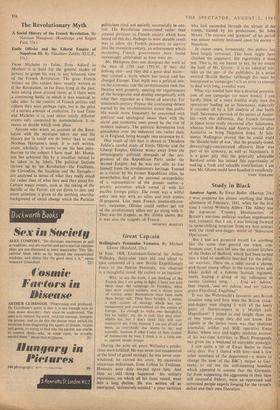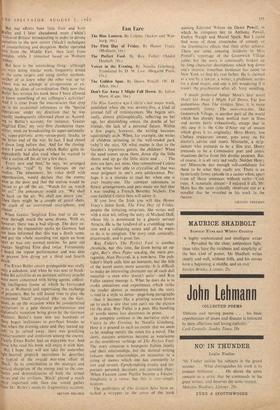Study in Black
Amateur Agent. By Ewan Butler. (Harrap, 21s.) Was prepared for almost anything that bleak afternoon of February, 1941, when for the first time I visited Woburn Abbey. The Abbey was the top-secret 'Country Headquarters' of Britain's war-time political warfare organisation and, romantic that I am, I was looking forward to spine-chilling Surprises from my first contact with the cloak-and-dagger world of 'Subversive Operations.'
But I had not prepared myself for anything 1 like the scene that greeted me when, con- ferences over, I was led into the ancient kitchen of the Dukes of Bedford, which had been turned into a kind of unofficial beer-hall for the pbliti- cal warriors. There on a table stood a plump, I' pink-faced young officer in the tartan trews and khaki jacket of a famous Scottish regiment, lustily leading a group of my colleagues in
racous German song. find wir fahren,' they roared, 'and wir fahren. und wir fahren gegen Engelland, Engelland.'
It was the Wehrmacht's favourite anti-British invasion song and here were the British cloak- and-dagger men singing it with all the beery gusto of Stormtroopers in a Munich pub. Magnificent! I joined in and taught them one or two more songs they did not know. The captain in the tartan trews was that ebullient journalist, soldier and SOE operative Ewan Butler, whose racy and highly readable account of his war-time activities in Black Propaganda has given me a weekend of enjoyable nostalgia.
I saw quite a bit of Ewan Butler in those early days. For I shared with him—and a few other members of the department—a desire to change the tone of the BBC's output to Ger- many, to cut out the well-meaning homilies which appeared to assume that the Germans, far from supporting the aggression of their then still successful Fiihrer, were an oppressed and terrorised people eagerly longing for the tyrant's defeat and their own liberation. But our efforts bore little fruit and both Butler and I later abandoned overt ('white') VOiee-of-Britain' broadcasting in order to devote ourselves to the new covert ('black') techniques of counterfeiting and deception. Butler operated lirst from the Middle East, then later from Sweden, while I remained based on Woburn Abbey.
tBut here is the astonishing thing: although We were doing similar work, frequently aimed at the same targets and using similar methods, neither of us knew what the other was up to. lhere was no attempt at co-operation or ex- change, let alone of co-ordination. Only now that . ltutler has,written his book have I been allowed to know something of my colleague's 'activities!
And it is clear from the inaccuracies that crop un in his occasional references to the 'Special Operations' tinder my direction that he was equally inadequately informed about us. Accord- ing to BUtler's account, for instance, 'Gustav Siegfried Eins,' my very first clandestine trans- nlitter, went on broadcasting its super-nationalis- lie, super-patriotic army-versus-party tirades to the bitter end of the war. In fact, I had closed it down long before that. And for the closing- down I used a technique which Butler quite in- dependently had also used when he wanted to take a station off the air for a few days.
'Every now and then,' he says, 'we arranged a. dramatic "raid" by the Gestapo on our studios. The announcer, his , voice shrill with RPprehension, would declare that the enemy were at the door and that the station would be • forced to go off the air. "Watch for us, watch for us!" the announcer would cry. "We shall
be back, on the air. We shall not desert you." 1 hen there might be a couple of pistol shots, the crash of an overturned microphone, and silence, . . .'
When Gustav Siegfried Eins had to die we Went through much the same drama. With us, however, there was a bad slip-up. The duty en- gineer at the transmitter spoke no German, had not been informed that this was a death scene, knd put the whole recording out again an hour later as was our normal routine. So poor old Gustav Siegfried Eins died twice. Fortunately 1 heard the repeat performance and was able to prevent him dying yet a third and fourth death.
: For Ewan Butler covert propaganda was really Only a sideshow, and when he was sent to Stock-
holm his activities as an assistant military attache Were more concerned with hiring agents, collect- ing intelligence (sonic of which he forwarded to us at Woburn) and supervising the exchange
(If prisoners. But he still found time to play the occasional 'black' practical jOke on the Ger-
Mans, as on the occasion when he counterfeited invitations to a gala theatre performance and ;IiPloniatie reception being given by the German Aiinister. Butler's team sent out hundreds of ihese bogus invitations to pro-Nazi Swedes so lhat vv hen the evening came and they turned LIP, °Illy to be turned away, there was gratifying 'Mbarrassment and confusion among the enemy. t-learly Ewan Butler had an enjoyable war. And lhose. who read his book will enjoy it with him.
Iltit. I hope they will not take the somewhat light-hearted pinprick operations he describes ,s typical of the overall war-time effort of ,111ack.' In its contribution to the strategic and ,actical deception of the enemy and to the con- fusion and demoralisation of both the armed forces and the civilians, 'Black' played a much 'note important role than one would gather from Mr. Butler's needs-be fragmentary account.
SEFTON DELMER































 Previous page
Previous page